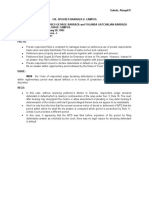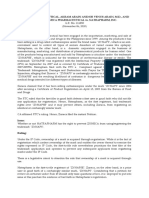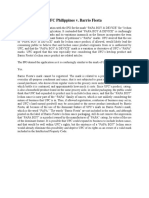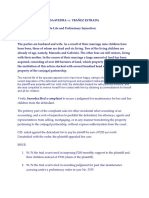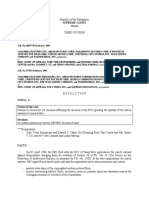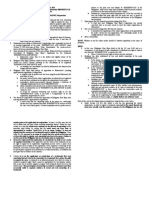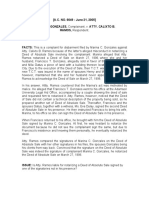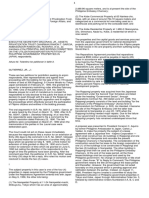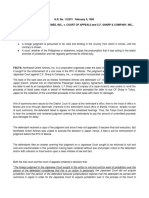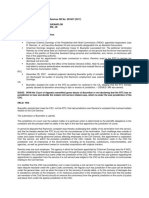0 ratings0% found this document useful (0 votes)
344 viewsUnilever Vs CA
Unilever Vs CA
Uploaded by
Zusmitha SalcedoUnilever Philippines aired a TV commercial for its laundry product that Procter & Gamble Philippines alleged imitated its protected "tac-tac" visual. P&G filed for and was granted a preliminary injunction against airing the commercial by the trial court. The CA affirmed, finding no grave abuse of discretion. Unilever argued the injunction disposed of the main case without a trial. The Supreme Court upheld the injunction, finding the limited airing period of commercials could make a permanent injunction illusory later, justifying interim relief to preserve the status quo until full trial. As Unilever was given opportunity to oppose the injunction, there was no grave abuse of discretion.
Copyright:
© All Rights Reserved
Available Formats
Download as DOCX, PDF, TXT or read online from Scribd
Unilever Vs CA
Unilever Vs CA
Uploaded by
Zusmitha Salcedo0 ratings0% found this document useful (0 votes)
344 views1 pageUnilever Philippines aired a TV commercial for its laundry product that Procter & Gamble Philippines alleged imitated its protected "tac-tac" visual. P&G filed for and was granted a preliminary injunction against airing the commercial by the trial court. The CA affirmed, finding no grave abuse of discretion. Unilever argued the injunction disposed of the main case without a trial. The Supreme Court upheld the injunction, finding the limited airing period of commercials could make a permanent injunction illusory later, justifying interim relief to preserve the status quo until full trial. As Unilever was given opportunity to oppose the injunction, there was no grave abuse of discretion.
Original Description:
case digest
Original Title
Unilever-vs-CA
Copyright
© © All Rights Reserved
Available Formats
DOCX, PDF, TXT or read online from Scribd
Share this document
Did you find this document useful?
Is this content inappropriate?
Unilever Philippines aired a TV commercial for its laundry product that Procter & Gamble Philippines alleged imitated its protected "tac-tac" visual. P&G filed for and was granted a preliminary injunction against airing the commercial by the trial court. The CA affirmed, finding no grave abuse of discretion. Unilever argued the injunction disposed of the main case without a trial. The Supreme Court upheld the injunction, finding the limited airing period of commercials could make a permanent injunction illusory later, justifying interim relief to preserve the status quo until full trial. As Unilever was given opportunity to oppose the injunction, there was no grave abuse of discretion.
Copyright:
© All Rights Reserved
Available Formats
Download as DOCX, PDF, TXT or read online from Scribd
Download as docx, pdf, or txt
0 ratings0% found this document useful (0 votes)
344 views1 pageUnilever Vs CA
Unilever Vs CA
Uploaded by
Zusmitha SalcedoUnilever Philippines aired a TV commercial for its laundry product that Procter & Gamble Philippines alleged imitated its protected "tac-tac" visual. P&G filed for and was granted a preliminary injunction against airing the commercial by the trial court. The CA affirmed, finding no grave abuse of discretion. Unilever argued the injunction disposed of the main case without a trial. The Supreme Court upheld the injunction, finding the limited airing period of commercials could make a permanent injunction illusory later, justifying interim relief to preserve the status quo until full trial. As Unilever was given opportunity to oppose the injunction, there was no grave abuse of discretion.
Copyright:
© All Rights Reserved
Available Formats
Download as DOCX, PDF, TXT or read online from Scribd
Download as docx, pdf, or txt
You are on page 1of 1
Unilever Philippines, Inc. vs.
CA and Procter and Gamble Philippines
GR 119280 August 10, 2006
Facts:
On August 24, 1994, Procter and Gamble Inc. filed a complaint for injunction with damages against Unilever alleging that
Unilever substantially and materially imitated the aforesaid "tac-tac" key visual in blatant disregard of its intellectual
property rights. This occurred when Unilever started airing a 60 second television commercial "TVC" of its "Breeze
Powerwhite" laundry product called "Porky” and the said commercial included stretching visual presentation and sound
effects almost identical or substantially similar to P&GP’s "tac-tac" key visual.
On August 26, 1994, Judge Gorospe issued an order granting a temporary restraining order and setting it for hearing on
September 2, 1994 for Unilever to show cause why the writ of preliminary injunction should not be issued. On appeal,
the CA rendered its decision finding that Judge Gorospe did not act with grave abuse of discretion in issuing the disputed
order.
Unilever now argues that the writ of preliminary injunction was issued by the trial court (and affirmed by the CA)
without any evidence of private respondent's clear and unmistakable right to the writ. Petitioner further contends that
the preliminary injunction issued against it already disposed of the main case without trial, thus denying petitioner of
any opportunity to present evidence on its behalf.
ISSUE:
Is preliminary injunction proper to enjoin the airing of TV commercials? (YES)
Held:
Yes. There was extreme urgency for the court a quo to act on plaintiff’s application for preliminary injunction. The airing
of TV commercials is necessarily of limited duration only. Without such temporary relief, any permanent injunction
against the infringing TV advertisements of which P&GP may possibly succeed in getting after the main case is finally
adjudicated could be illusory if by then such advertisements are no longer used or aired by petitioner. It is therefore not
difficult to perceive the possible irreparable damage which P&GP may suffer if respondent Judge did not act promptly on
its application for preliminary injunction.
Injunction is resorted to only when there is a pressing necessity to avoid injurious consequences which cannot be
remedied under any standard compensation. As correctly ruled by the CA, there was an extreme urgency to grant the
preliminary injunction prayed for by P&GP considering that TV commercials are aired for a limited period of time only. In
fact, this Court takes note of the fact that the TV commercial in issue ― the Kite TV advertisement ― is no longer aired
today, more than 10 years after the injunction was granted on September 16, 1994.
The sole objective of a writ of preliminary injunction is to preserve the status quo until the merits of the case can be
heard fully. A writ of preliminary injunction is generally based solely on initial and incomplete evidence. 9Thus, it was
impossible for the court a quo to fully dispose of the case, as claimed by petitioner, without all the evidence needed for
the full resolution of the same. To date, the main case still has to be resolved by the trial court.
The issuance of a preliminary injunction rests entirely on the discretion of the court and is generally not interfered with
except in cases of manifest abuse. There was no such abuse in the case at bar, especially because petitioner was given
all the opportunity to oppose the application for injunction. The fact was, it failed to convince the court why the
injunction should not be issued. Thus, in Santos v. Court of Appeals, we held that no grave abuse of discretion can be
attributed to a judge or body issuing a writ of preliminary injunction where a party has not been deprived of its day in
court as it was heard and it exhaustively presented all its arguments and defenses.
You might also like
- Tacuboy: Original Jurisdiction Appellate JurisdictionDocument2 pagesTacuboy: Original Jurisdiction Appellate JurisdictionReuel Realin93% (108)
- Mock Board Criminal Law 2Document13 pagesMock Board Criminal Law 2roelalviar100% (10)
- LUZVIMINDA CANLAS v. REPUBLICDocument2 pagesLUZVIMINDA CANLAS v. REPUBLICZusmitha Salcedo100% (3)
- Rule On Custody of Minors and Writ of Habeas CorpusDocument5 pagesRule On Custody of Minors and Writ of Habeas CorpusMelody May Omelan Arguelles100% (2)
- RULE 69 (PARTITION) ReviwerDocument4 pagesRULE 69 (PARTITION) ReviwerNeon True Beldia100% (2)
- Nachura Notes Local GovernmentsDocument34 pagesNachura Notes Local GovernmentsNowhere Man100% (18)
- Fernando V. Gorospe, Jr. and Procter and Gamble Philippines, Inc. (P&GP) Which Affirmed The Issuance by The Court A Quo of A Writ ofDocument2 pagesFernando V. Gorospe, Jr. and Procter and Gamble Philippines, Inc. (P&GP) Which Affirmed The Issuance by The Court A Quo of A Writ ofPaulo Salanguit100% (1)
- 06 Mitchell Brothers Film Group v. Cinema Adult Theater (TAN)Document3 pages06 Mitchell Brothers Film Group v. Cinema Adult Theater (TAN)Rudejane Tan100% (1)
- Romago V SiemensDocument2 pagesRomago V SiemensMikaila Ross Fernandez100% (3)
- People vs. UmaliDocument1 pagePeople vs. UmaliRedd LapidNo ratings yet
- Superior Commercial Enterprises, Inc. vs. Kunnan Enterprises LTDDocument2 pagesSuperior Commercial Enterprises, Inc. vs. Kunnan Enterprises LTDJerelleen Rodriguez100% (3)
- SERI V ORALEDocument2 pagesSERI V ORALEMaeNo ratings yet
- Manly Sportswear V Dadodette DigestDocument2 pagesManly Sportswear V Dadodette DigestKate Eloise EsberNo ratings yet
- Habana v. RoblesDocument1 pageHabana v. RoblesJoe CuraNo ratings yet
- Feist Publications, Inc. v. Rural Telephone Service Company, IncDocument2 pagesFeist Publications, Inc. v. Rural Telephone Service Company, IncSyannil VieNo ratings yet
- Warner Bros vs. Columbia PicturesDocument2 pagesWarner Bros vs. Columbia PicturesPMVNo ratings yet
- Habana Vs RoblesDocument2 pagesHabana Vs RoblesRex Traya100% (2)
- Eizmendi, Jr. and Valle Verde Country Club, Inc. Vs FernandezDocument2 pagesEizmendi, Jr. and Valle Verde Country Club, Inc. Vs FernandezAriza YogiNo ratings yet
- W Land v. Starwood Hotels, G.R. 222366, December 4, 2017Document1 pageW Land v. Starwood Hotels, G.R. 222366, December 4, 2017enriquemmmNo ratings yet
- 313 - Timeshare Realty Corp. vs. LaoDocument2 pages313 - Timeshare Realty Corp. vs. LaoAdi Hernandez100% (1)
- KR Savage Vs TaypinDocument1 pageKR Savage Vs TaypinCelinka ChunNo ratings yet
- 216 Spouses Barraza v. CamposDocument1 page216 Spouses Barraza v. CamposAbegail GaledoNo ratings yet
- CHing Kian V CADocument1 pageCHing Kian V CAAlexandraSoledadNo ratings yet
- HABANA v. ROBLES DigestDocument5 pagesHABANA v. ROBLES DigestPaoloDim100% (1)
- SASOT Vs PEOPLEDocument1 pageSASOT Vs PEOPLEcha100% (1)
- 4 Migallon - LaborDocument5 pages4 Migallon - LaborTal MigallonNo ratings yet
- Zuneca vs. NatrapharmDocument2 pagesZuneca vs. Natrapharmcharismamichelle14100% (6)
- Pilipinas Shell Petroleum Corp. V Royal Ferry ServicesDocument2 pagesPilipinas Shell Petroleum Corp. V Royal Ferry ServicesJeunaj LardizabalNo ratings yet
- UFC Philippines V PDFDocument1 pageUFC Philippines V PDFMarites regaliaNo ratings yet
- Property Lav102919Document2 pagesProperty Lav102919leizlNo ratings yet
- Case: Aalmuhammed V. Lee 202 F.3d 1227 (9 Cir. 2000) PONENTE: Kleinfeld, Circuit Judge AUTHOR: QuintanaDocument1 pageCase: Aalmuhammed V. Lee 202 F.3d 1227 (9 Cir. 2000) PONENTE: Kleinfeld, Circuit Judge AUTHOR: QuintanajuslynsNo ratings yet
- Pascual Godines Vs CADocument2 pagesPascual Godines Vs CAJay Kent Roiles100% (2)
- Aboitiz Equity Vs ChiongbianDocument3 pagesAboitiz Equity Vs Chiongbianana ortiz100% (1)
- Bank of America, NT & SA v. Court of AppealsDocument2 pagesBank of America, NT & SA v. Court of AppealsRyan AcostaNo ratings yet
- Kho V CADocument1 pageKho V CAAlexandraSoledadNo ratings yet
- Saavedra vs. Ybanes EstradaDocument2 pagesSaavedra vs. Ybanes EstradaAngelo CastilloNo ratings yet
- Anson Trade Center vs. Pacific BankingDocument2 pagesAnson Trade Center vs. Pacific BankingKobe Lawrence VeneracionNo ratings yet
- Labor Congress Vs NLRC 290 Scra 509 UpdatedDocument1 pageLabor Congress Vs NLRC 290 Scra 509 UpdatedNina LimNo ratings yet
- Ecole de Cuisine Manille (Cordon Bleu of The Philippines), Inc., vs. Renaud Cointreau & Cie and Le Cordon Bleu Int'l., B.V. FactsDocument1 pageEcole de Cuisine Manille (Cordon Bleu of The Philippines), Inc., vs. Renaud Cointreau & Cie and Le Cordon Bleu Int'l., B.V. FactsNic NalpenNo ratings yet
- Angchangco v. OmbudsmanDocument2 pagesAngchangco v. OmbudsmanDaryl Kenneth DayritNo ratings yet
- The Manila Electric Railroad and Light Company VDocument3 pagesThe Manila Electric Railroad and Light Company VMicaellaNo ratings yet
- Levi Strauss V Tony LimDocument3 pagesLevi Strauss V Tony LimJaz SumalinogNo ratings yet
- E.I. Dupont de Nemours and Co. v. FranciscoDocument2 pagesE.I. Dupont de Nemours and Co. v. FranciscoMiguel Bergu0% (1)
- Verzosa v. Court of AppealsDocument2 pagesVerzosa v. Court of AppealsEymarie AlonzoNo ratings yet
- FRANCISCO EIZMENDI JR. vs. Teodorico FernandezDocument3 pagesFRANCISCO EIZMENDI JR. vs. Teodorico FernandezMariaFaithFloresFelisarta100% (1)
- William Golangco Corp v. Ray BurtonDocument2 pagesWilliam Golangco Corp v. Ray BurtonJassy BustamanteNo ratings yet
- Societe Des Produits Nestle Vs CA Digest - MungcalDocument2 pagesSociete Des Produits Nestle Vs CA Digest - Mungcalc2_charishmungcalNo ratings yet
- OLAÑO, Et - Al. v. CODocument3 pagesOLAÑO, Et - Al. v. CORNicolo BallesterosNo ratings yet
- Creser Precision System Inc. vs. Ca and Floro International Corp.Document2 pagesCreser Precision System Inc. vs. Ca and Floro International Corp.Joshua Erik Madria100% (1)
- Filipino Society of Composers Vs Benjamin TanDocument2 pagesFilipino Society of Composers Vs Benjamin TanAngelNo ratings yet
- IPLDocument9 pagesIPLDon TiansayNo ratings yet
- Heritage Hotel Vs National Union WorkersDocument1 pageHeritage Hotel Vs National Union WorkersMariz GalangNo ratings yet
- 186 Mantruste System V CADocument2 pages186 Mantruste System V CAJulius Geoffrey Tangonan100% (2)
- Columbia Pictures Inc Vs CA - 1994Document3 pagesColumbia Pictures Inc Vs CA - 1994Elead Gaddiel S. AlbueroNo ratings yet
- Rebollido Vs CADocument2 pagesRebollido Vs CAPaolo BrillantesNo ratings yet
- 01 Mirpuri v. Court of Appeals 318 SCRA 516Document2 pages01 Mirpuri v. Court of Appeals 318 SCRA 516Geewee Vera FloresNo ratings yet
- Case Digest Berris Agricultural v. Abyadang (G.R. 183404Document3 pagesCase Digest Berris Agricultural v. Abyadang (G.R. 183404Charity RomagaNo ratings yet
- Rene Knecht and Knecht Inc v. UCPDocument1 pageRene Knecht and Knecht Inc v. UCPCheCheNo ratings yet
- Coffee Partners Vs San Francisco CoffeeDocument3 pagesCoffee Partners Vs San Francisco Coffeepeanut47100% (1)
- Employees Union of Bayer Phils. V Bayer Phils. Inc., Et Al.Document4 pagesEmployees Union of Bayer Phils. V Bayer Phils. Inc., Et Al.Patricia GonzagaNo ratings yet
- San Miguel Pure Foods Company, Inc. v. Foodsphere, Inc.Document3 pagesSan Miguel Pure Foods Company, Inc. v. Foodsphere, Inc.MaeNo ratings yet
- LIP Case Copyright - Sambar Vs Levi StraussDocument2 pagesLIP Case Copyright - Sambar Vs Levi StraussShana0% (1)
- MR Holdings, LTD v. Sheriff Carlos Bajar, Et Al.Document1 pageMR Holdings, LTD v. Sheriff Carlos Bajar, Et Al.CheCheNo ratings yet
- Birkenstock v. Phil. Shoe Expo - DIGESTDocument2 pagesBirkenstock v. Phil. Shoe Expo - DIGESTGabrielle DayaoNo ratings yet
- ProvRem CD Unilever Vs CADocument2 pagesProvRem CD Unilever Vs CAApril Gem BalucanagNo ratings yet
- The Supreme Court Held That Lack of Intent To Commit A Criminal Act, or Good InfringementDocument2 pagesThe Supreme Court Held That Lack of Intent To Commit A Criminal Act, or Good InfringementjoyNo ratings yet
- POLITICAL LAW - Doctrines and LawsDocument1 pagePOLITICAL LAW - Doctrines and LawsZusmitha SalcedoNo ratings yet
- Gonzales v. Ramos - DigestDocument2 pagesGonzales v. Ramos - DigestZusmitha SalcedoNo ratings yet
- How To Answer Bar QsDocument48 pagesHow To Answer Bar QsZusmitha Salcedo100% (1)
- Real and Personal Property ConflictsDocument18 pagesReal and Personal Property ConflictsZusmitha SalcedoNo ratings yet
- Petition For Probate of WillDocument3 pagesPetition For Probate of WillZusmitha Salcedo100% (2)
- Parody of ProvremDocument185 pagesParody of ProvremZusmitha Salcedo100% (1)
- BAYOCA v. NOGALESDocument2 pagesBAYOCA v. NOGALESZusmitha SalcedoNo ratings yet
- Cases - TrademarkDocument39 pagesCases - TrademarkZusmitha SalcedoNo ratings yet
- Petition For EscheatDocument1 pagePetition For EscheatZusmitha Salcedo50% (2)
- INTERPLEADERDocument3 pagesINTERPLEADERZusmitha SalcedoNo ratings yet
- Sales - Additional Case DigestDocument5 pagesSales - Additional Case DigestZusmitha SalcedoNo ratings yet
- NORTHWEST ORIENT AIRLINES v. CADocument4 pagesNORTHWEST ORIENT AIRLINES v. CAZusmitha SalcedoNo ratings yet
- People VS RafonDocument2 pagesPeople VS RafonZusmitha SalcedoNo ratings yet
- SUPERLINES v. PNCCDocument2 pagesSUPERLINES v. PNCCZusmitha SalcedoNo ratings yet
- Ramirez v. Vda. de RamirezDocument1 pageRamirez v. Vda. de RamirezZusmitha Salcedo100% (2)
- People Vs Laguardia Et. AlDocument6 pagesPeople Vs Laguardia Et. AlZusmitha SalcedoNo ratings yet
- Chaves Vs Pea AmariDocument21 pagesChaves Vs Pea AmariZusmitha SalcedoNo ratings yet
- Yun Kwan Byung v. PAGCOR 608 SCRA 107 2009 DigesDocument1 pageYun Kwan Byung v. PAGCOR 608 SCRA 107 2009 DigesZusmitha SalcedoNo ratings yet
- Buenaflor Vs RamirezDocument2 pagesBuenaflor Vs RamirezGillian Caye Geniza Briones100% (1)
- Guidelines in The Reassignment of PNP Personnel Who Are Witness in Drug-Related CasesDocument1 pageGuidelines in The Reassignment of PNP Personnel Who Are Witness in Drug-Related CasescalatravaNo ratings yet
- NANOR v. AUTO PARTS LTDDocument10 pagesNANOR v. AUTO PARTS LTDNaa Odoley OddoyeNo ratings yet
- 169220-2014-Spouses Crisologo v. JEWM Agro-IndustrialDocument10 pages169220-2014-Spouses Crisologo v. JEWM Agro-IndustrialNichole Patricia PedriñaNo ratings yet
- Perjury MaterialsDocument4 pagesPerjury MaterialsJoel C AgraNo ratings yet
- De Dios Carlos Vs Sandoval Case DigestDocument2 pagesDe Dios Carlos Vs Sandoval Case Digestfaith turnoNo ratings yet
- Verba Legis Non Est Recedendum.: of Strict Interpretation That May Serve To Impair Import of PardonDocument16 pagesVerba Legis Non Est Recedendum.: of Strict Interpretation That May Serve To Impair Import of PardonWazzupNo ratings yet
- Constitution of Kenya 2010Document157 pagesConstitution of Kenya 2010Ombudsman KenyaNo ratings yet
- SANRIO COMPANY LIMITED v. EDGAR C. LIMDocument9 pagesSANRIO COMPANY LIMITED v. EDGAR C. LIMKhate AlonzoNo ratings yet
- (G.R. No. 134298. August 26, 1999) : RAMON C. TAN, Petitioner, vs. PEOPLE OF THE PHILIPPINES, RespondentDocument7 pages(G.R. No. 134298. August 26, 1999) : RAMON C. TAN, Petitioner, vs. PEOPLE OF THE PHILIPPINES, RespondentRe doNo ratings yet
- de Jesus v. Sanchez-MalitDocument2 pagesde Jesus v. Sanchez-MalitKaren Joy MasapolNo ratings yet
- MTCDocument14 pagesMTCbeckymay sajo100% (1)
- Equatorial Realty Development, Inc. vs. Mayfair Theater, Inc. G.R. No. 133879Document17 pagesEquatorial Realty Development, Inc. vs. Mayfair Theater, Inc. G.R. No. 133879robdeqNo ratings yet
- Income Taxation Reviewer Banggawan 2019-1Document11 pagesIncome Taxation Reviewer Banggawan 2019-1bibiquoh7No ratings yet
- People V SamusDocument15 pagesPeople V SamusTon Ton CananeaNo ratings yet
- Underhill Vs HernandezDocument2 pagesUnderhill Vs HernandezMaria Cherrylen Castor QuijadaNo ratings yet
- Admin Law 2Document284 pagesAdmin Law 2Aniqua ZakiNo ratings yet
- Signature Not VerifiedDocument3 pagesSignature Not VerifiedSaubhik Debnath100% (1)
- Cir V Pascor Realty & Dev'T Corp Et. Al. GR No. 128315, June 29, 1999Document8 pagesCir V Pascor Realty & Dev'T Corp Et. Al. GR No. 128315, June 29, 1999Cristy Yaun-CabagnotNo ratings yet
- De Belen Vda. de Cabalu vs. Tabu 2Document4 pagesDe Belen Vda. de Cabalu vs. Tabu 2dave_88opNo ratings yet
- (G.R. Nos. 140199-200. February 6, 2002) Felicito S. Macalino, Petitioner, vs. Sandiganbayan and OFFICE OF THE OMBUDSMAN, RespondentsDocument14 pages(G.R. Nos. 140199-200. February 6, 2002) Felicito S. Macalino, Petitioner, vs. Sandiganbayan and OFFICE OF THE OMBUDSMAN, RespondentsPatricia Nicole BalgoaNo ratings yet
- Recovery of Personal Property:replevinDocument10 pagesRecovery of Personal Property:replevinFrancis Nico PeñaNo ratings yet
- Zaz I HearingDocument280 pagesZaz I HearingBen SmithNo ratings yet
- Philippine Bank of Communications V. Cir G.R. No. 112024 January 28, 1999 Quisumbing, JDocument2 pagesPhilippine Bank of Communications V. Cir G.R. No. 112024 January 28, 1999 Quisumbing, Jbrendamanganaan100% (1)
- Cast of CharactersDocument16 pagesCast of CharacterschersmauiNo ratings yet





















